Vibrations are perhaps the most annoying problem that can develop in a vehicle. Not only is the incessant shaking upsetting, but pinpointing the exact reason behind the issue is another challenge. There are a plethora of reasons a car vibrates when accelerating, and some of them are expensive to repair.
This may make you think that had it been you, you would simply just convince yourself to live like that, but that’s not a good idea. A car wasn’t made to vibrate under acceleration, and the newly-developed vibration in your car is a bad sign. It can damage other parts of the vehicle along with posing a safety threat.
Fortunately, experienced mechanics have the tools and expertise to identify these issues and repair them in no time. If you are somewhat skilled at handling the mechanics of a car, you may be able to help too. To make the job easier for you, we have researched topics like why a car vibrates, the parts that could be causing it, and much more.
Let’s dive right in.
The Various Parts That Could Be Causing The Vibrations
A car is held together by a neatly arranged collection of parts, some of which are rather delicate. Thus, even for a veteran, detecting which part is causing the vibration might get confusing. If your car vibrates when accelerating, these parts may be contributing to the problem.
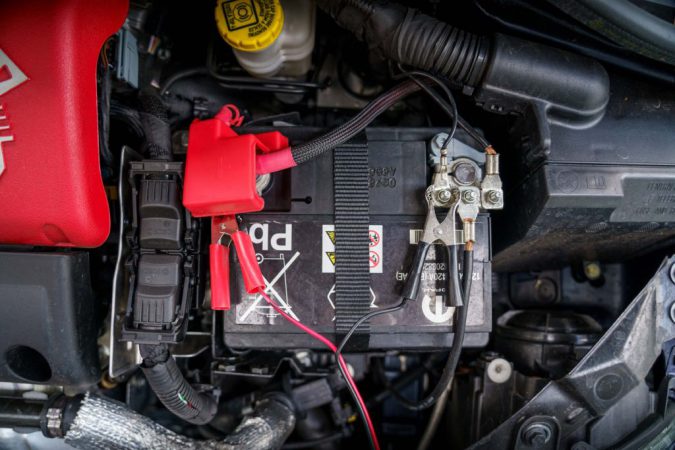
Axles
In simplest words, your car’s axles are components of the vehicle that hold the wheels. A regular car has two of them but a large commercial truck or a 6×6 has more.
Calipers
The brake calipers are located inside the car’s braking system and are tasked with physically squeezing the rotors to halt the car in its tracks. Brake pads are secured to calipers and supply the friction required to slow the car down.
Driveshaft
The transmission and engine of the vehicle deliver power to the wheels and a differential through a driveshaft. It turns to transmit that torque and power, so naturally, a bend in it can result in severe vibrations as the car accelerates.
Motor Mounts
You can understand the purpose of these parts from the name. Motor mounts hold the frame and engine together. When the car is revved, the engine moves a significant amount, so it’s essential to have functional mounts to keep excess movements and vibrations at bay.
Car Vibrates When Accelerating: Common Causes
One of the main reasons vibrations in a car are so annoying is because the problem is often hard to detect. You will have to go through each symptom and its related part to decipher what’s up with your vehicle. These are some of the more common causes of cars vibrating when accelerated.
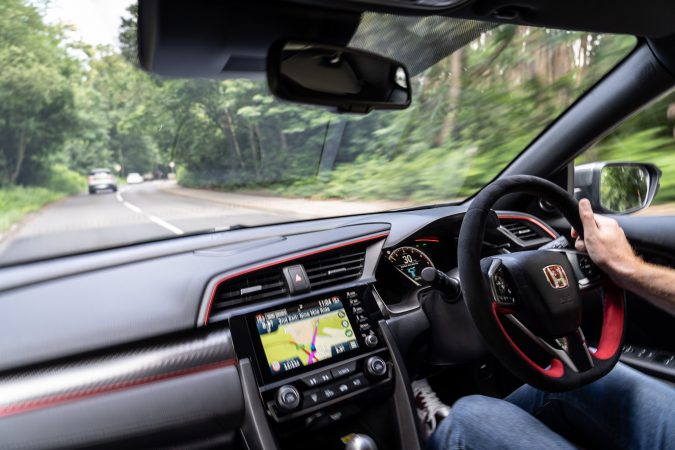
Car Vibrates When Accelerating: Bad Inner CV Joint
CV joints can be found near the end of every axle and they come with both inner and outer joints. When the inner one is damaged to begin deteriorating, the car starts vibrating under rough acceleration. As the situation worsens, the minimal vibrations transform into violent shakes – if under load.
If there is a tear in the joint boot, the CV joints start taking the hit. Dirt or water accumulation inside the boot damages it and pollutes the lubrication protecting the splines inside.
Due to a lack of proper lubrication, metal on metal contact slowly causes failure. This issue can only be solved by replacing the CV joint.
Car Vibrates When Accelerating: Broken Motor Mounts
As we mentioned before, the motor mount is responsible for physically holding the engine to the frame. Another purpose is to reduce or dampen engine vibration so a constant shaking does not ring through the car when it’s running.
Engine mounts feature a hard rubber material construction that lets them absorb vibrations. If a motor mount is broken or damaged, not only does the vibration get too much to handle, but it can also misalign and eventually break other parts of the engine since the engine isn’t properly positioned.
A damaged motor mount can be felt when idling, however, the shaking is more obvious when accelerating the vehicle as the engine has to function harder. Changing a damaged motor mount can solve this issue. It’s important to remember that if a motor mount is damaged, the other mounts will bear the additional load and will most likely fail at one point.
Car Vibrates When Accelerating: Unbalanced Tires
Did you recently install new tires into your cars and can’t stop admiring how elegant they look now? Did the change also bring along a frustrating shaking when driving the car? This might be the result of misaligned tires. A tire mounted on a wheel does not have the same weight distributed all the way around.
To solve this, a tire installer mounts the wheel/tire assembly on a balancing machine before sticking on little wheel weights on the rim at certain locations to fix the balance. When the tire turns, even the slightest weight imbalances will create a vibration.
When the tire is turning much faster at higher speeds, the vibrations are much more noticeable. The steering wheel may just shake. If the car vibrates despite being at a constant speed but worsens with higher speeds, unbalanced tires are the reason. Having said that, it is also possible that an adhesive wheel weight fell off. Bring your car back to the shop and ask them to rebalance the tires; that should solve the problems.
Car Vibrates When Accelerating: Loose Lug Nuts
Loose lug nuts are one of the more common problems in a car, and it’s alarmingly common. Improperly torqued-down lug nuts loosen over time, giving the wheels an undesirable wobble when driving. When accelerating, you would feel like the car is shaking.
If left unattended, these nuts will loosen completely and the wheel might just fall off mid-drive. Suffice to say, no one wants that on the road. The best way to avoid this problem is by using the right lug nut size and ensuring they are properly secured during every routine maintenance.
To make sure your car is not suffering from loose lug nuts problems, use a torque wrench to tighten each lug nut to its required factory specs. For people who don’t own a torque wrench, viable alternatives are either a tire iron or a regular lug nut wrench.
Car Vibrates When Accelerating: Bent Driveshaft
If your car features a rear-wheel drive (RWD), the driveshaft (also called the propeller shaft) delivers power to the rear axle from the engine. Thus, a slightly damaged or bent driveshaft (here’s how to check for one) will make the car shake when accelerating at lower speeds.
Since a driveshaft cannot be repaired, replacing is the only option.
Car Vibrates When Accelerating: Bent Axle
Driving your car over a curb, large rock, or bumps, there might be some damage inside that you cannot see. Just because the damage is not visible, does not mean it’s not there at all. The incident could easily bend your axle, which is a serious issue.
You will start experiencing vibrations when riding your car which worsens when you accelerate it. Like the driveshaft, this part too needs to be replaced to avoid causing further damage to your car.
Car Vibrates When Accelerating: Stuck Brake Caliper
A faulty brake caliper can cause vibrations ripping through the car. In this specific situation, the steering wheel will start vibrating once the car reaches around 40 to 50 miles per hour. As the car accelerates and continues to reach higher speeds, the shaking will get worse. And when you finally stop the car, you will notice a burning smell from your vehicle.
If you suspect a broken or stuck brake caliper, the problem should be easy to confirm thanks to the smell. You will have to examine all the parts of the brake system, paying special attention to the caliper slides, piston, and bolt.
Most of the time you can get away by cleaning and re-greasing the components but if the part has failed, it will have to be replaced.
Car Vibrates When Accelerating: Disconnected Or Torn Vacuum Hose
Another common problem that causes severe stuttering or shaking of a car when being driven. If a vacuum house develops an air leak or gets disconnected due to little tear, the inadequacy of air pressure can lead to a miscommunication with the sensors. As a result, your car can backfire, misfire, lose power, or show other issues where the engine fails to run smoothly.
Check all the hoses to ensure they are linked properly and do not have any cracks or tears in them. You might need to reattach some of the hoses; use a small clamp for that.
On turbocharged cars, vacuum hoses are more likely to disconnect. Replacing them with stronger silicone hoses is amongst the most common permanent solutions.
Car Vibrates When Accelerating: Worn Or Dirty Spark Plugs
Dirty or fouled-up spark plugs can make the engine misfire. The issue is most prominent when the car is stopped but you may also experience shaking in your car when you accelerate it.
If you can’t recall the last you changed the spark plugs, this is a sign that you should do it now. If you take one out and notice a dark buildup on the apex, chances are, almost all of the spark plugs are damaged.
Car Vibrates When Accelerating: More Causes
Although less likely, missing or loose wheel weights, accumulation of snow in the backside of the wheel, something plastic or tar wrapped across an axle or drive shaft can cause vibrations when driving. And even more, uncommon reasons are damaged crankshaft dampers or collapsed engine mounts.
As a solution, carefully clean the buildup of snow on the wheel, scrape off the tar or cut off the plastic covering. If there is a loose wheel weight, you have to rebalance the tires at a repair shop. Leave damper and motor mount problems to a certified professional.
When Does A Car Shake And How It Can Be Related To The Symptoms?
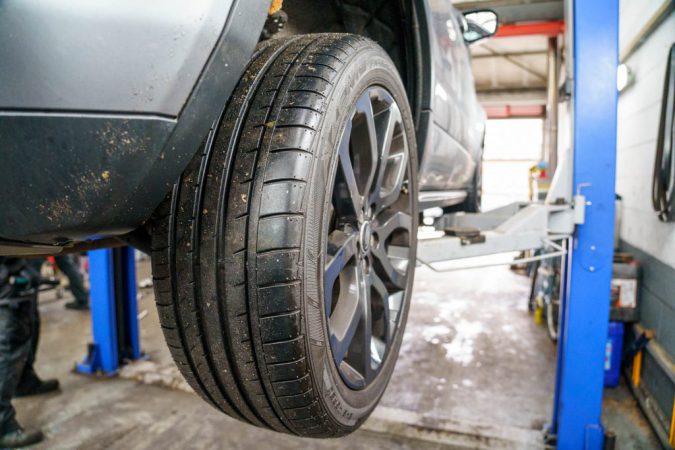
The vibrations in a car don’t only show up when you accelerate it. Based on when the shaking starts, different parts of the car are showing signs of damage. Here’s how to properly diagnose each one.
1. Car Vibrates When Idle
If the engine is not running properly, the car will shake even in idle. Based on the particular cause, some vibrations can be more severe. You might also feel or notice the RPM (revolutions per minute) changing randomly. Due to lower engine speeds and greater engine load, rough idle is generally more obvious in “Drive” gear when sitting at a red light.
Depending on how serious the problem is, you may also experience backfiring or stalling.
Solution
A smooth-idling engine is indicative of an engine’s fuel, air-fuel mixture, emission systems, and ignition are working completely fine. If that is not the case:
- Inspect and change any dirty PCV valve and air filter that can deprive the engine of fuel or air.
- Inspect for vacuum leaks
- Change the work spark plugs, damaged or defective ignition coils, distributor cap, or the ignition wires – all fixable DIY style.
Clogged fuel injectors or a contaminated fuel filter can also be the reason behind shaking and rough idling. Try changing the fuel filter and apply fuel injector cleaning treatment to the fuel tank. Filters are easy to change and usually cheap. Refer to the owner’s manual and make sure to change the spark plugs and filters at the recommended intervals provided by the manufacturer. If this doesn’t solve the vibrating, it may be time to bring your car to your local repair shop.
2. On Acceleration
In addition to the reasons stated above, that makes a car vibrate on acceleration, low automatic transmission fluid, or ATF can cause the vehicle to shudder. Check if the CEL (check engine light) is on when the car vibrates when accelerating. If the light is on, it likely means a failed, dirty, or poor mechanical component or an engine sensor is transmitting intermittent or haphazard data to the car’s computer (ECM).
Solution
- Pull-over and check if your car is safe to drive
- Inspect the clutch master cylinder and automatic transmission fluid levels. Your car’s owner’s manual will tell you where the clutch master cylinder and transmission dipstick are located and which particular fluids your model, make, and year vehicle requires.
- Perform a visual under-hood examination if the CEL is on. Look for cracked, damaged, or loose wires, electrical connectors, or hoses.
- Stop driving the car if the CEL is flashing at any given time. This sensor indicates major drivetrain problems. When the ECM senses a problem, it puts the vehicle into “Limp Home Mode”, a setting that greatly decreases engine power and lets you drive the car to a repair shop.
- Rely on common sense. If you can’t safely navigate to a repair shop, call for a towing service.
3. While Driving
If your car vibrates when accelerating during driving, then the wheels and tires could be causing the issue as well.
Wheels And Tires
Damaged, worn, over/under-inflated, or misaligned tires can cause shaking or vibrations at medium to fast speeds. We can note a few common causes for this. A cracked or vent wheel or a damaged tire will make the car shake.
Solution
- Check tire pressure. Under- or over-inflated tires quickly overheat and wear abnormally, leading to low and high-speed vibrations. Check your car’s tires for bulges and sidewall damage, along with wear and tear on the middle or edges of the tires.
- Ask the tire service center to turn and balance the wheels and tires on your car. Check of a bent or worn suspension part or an unbalanced wheel alignment aren’t the reasons behind irregular tire wear (tire feathering, scalloping, cupping).
- Basic tire maintenance should be a part of everyone’s schedule. Pick up air pressure gauges and tread depth gauges online. You can even find them at your local automotive parts stores. Change any tire with a tread coming in at 4/32” and under.
Axles, Suspension, And Hub Bearings
Damaged, worn, or loose suspension parts (ball joints, tie-rod ends, bushings, mounting hardware), constant velocity (CV) joints, or wheel hub bearings will result in vibrations and shaking at any speed. They are more noticeable when traveling at decreased speeds and when the wheels are completely rotated. A worn or bent drive hub bearing, axle, or misaligned driveshaft can be the reason behind a car vibrating when accelerating.
Solution
- Inspect for rips or cuts in the CV joint rubber “boot” seals. If water enters the torn CV joint seal it will damage the joint quickly, causing shaking and grinding.
- Damaged or worn suspension parts, wheel hub bearings, or wheels can lead to abnormal tire tread wear, making the car shake. These damages can be the result of an accident or just a simple collision against a curb.
- When in doubt, get a repair shop to inspect the problems and pay to rectify them correctly.
4. When Stopping
The brakes could be causing the vibration when you’re stopping. Make sure to have a look.
Brakes
If the car vibrates only when stopped, the brake system is perhaps the offender. Usual problems include loose, contaminated or worn brake pads as well as cracked or warped disc rotors. Overheating can cause the rotor to warp. Corroded/rusty brake caliper or harsh driving forces the brake pads to collide against the rotors when moving.
Solution
- Replace rotors and pads – it can be a DIY project. However, repairs like calipers and brake hardware are best left to the professionals.
How Serious Or Dangerous Are These Issues?
There’s no way to sugarcoat this: if you keep ignoring the symptoms stated above and drive your car as you would normally despite the stuttering, there is a super high chance that you are going to cause an accident. Not only are you putting yourself at risk, but you can seriously injure a pedestrian.
Even an unbalanced tire can cause safety hazards with your vehicle and make it difficult to control at faster speeds.
How Much Does It Cost To Repair Vibrations?
If you’re lucky, the reason your car vibrates when accelerating will be something simple, such as a tire that requires balancing. Problems like this can be fixed for cheap and easy, especially if the repair shop provides extended services on everything you buy at their location. Remember that these costs are only estimated from average costs. Experiences tend to differ vastly, so consider this a starting point.
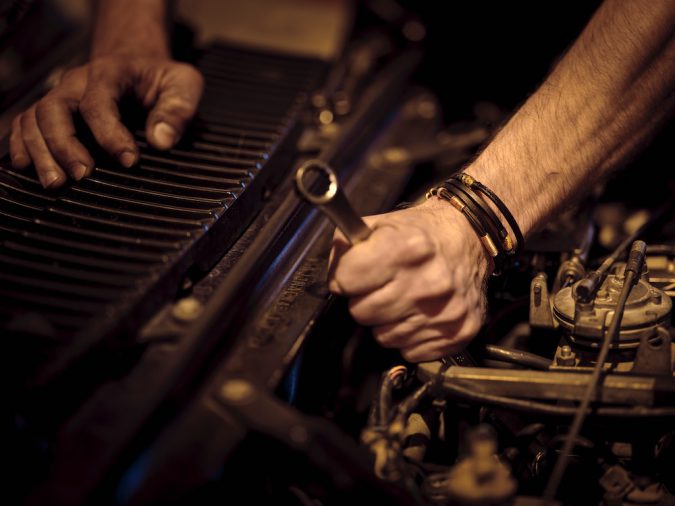
As for all the other problems, the service costs will look something like this:
CV Joints
Unfortunately, changing CV joints is an expensive affair, no matter the car. A basic CV joint runs for about $400 to $500 sometimes, and the labor costs will drive the total price much higher. Expect to spend anywhere between $500 to $1,000 to change your car’s CV joint. Multiply that by whatever number of CV joints have to be replaced (if needed).
Driveshaft
If you get lucky, you will be able to call it a day by spending $500 to $1,000 on replacing the driveshaft. Needless to say, it’s a pricey repair.
Motor Mounts
Not the worst of the batch. Changing motor mounts can run between $200 to $600, even more in some models and model years.
Brakes
It’s difficult nailing down a price for brake replacement as several parts could be responsible for the malfunction. The fix can be as pricey as a caliper replacement – capable of going up to $800, or as simple as replacing the brake pads.
Tires
In some cases, you can get the tires balanced for free. Tire shops occasionally offer free rotations and balancing for products bought there. But if you do end up paying for the job, it should cost less than $20.
Can You Perform The Repairs Yourself?
Definitely! You can perform the repairs yourself with one thing in mind: some of these fixes are on the more complex end of the spectrum – not to mention time-consuming. You cannot work out on the street so you will need a dedicated spot for the repair, like a garage.
Before diving into any of these issues, make sure you have the maintenance manual nearby so you can get specific details about your car.
Car Shaking: Facts You Need to Know
- If your car shakes when accelerating, braking, or idling, it’s time to investigate the problem.
- A shaky idling car can indicate a problem with the engine, such as loose engine mounts, faulty fuel injectors, worn-out spark plugs, or a bad timing belt.
- Loose or damaged engine mounts may also cause your car to shake when accelerating.
- A misaligned steering and suspension system can cause your steering wheel to shake when you accelerate, which requires an alignment check and adjustment.
- Shaking when braking could indicate warped brake rotors, worn-out brake pads, or insufficiently-lubricated guide pins.
- Misaligned wheels or improperly balanced tires could cause shaking when driving fast.
- Wheel misalignment happens when suspension components are not properly angled.
- Tire imbalance occurs when the weight of your car isn’t properly distributed on all four tires and can lead to excessive shaking, especially when driving above 55 mph.
- Imbalanced tires can wear out prematurely, creating dangerous driving conditions that can only be remedied with entirely new tires.
- It’s important to pay attention to when, where, and how your car shakes to diagnose the issue and seek necessary repairs to ensure safe driving conditions.
Conclusion
In summary, when your car vibrates when accelerating, you have to get that checked (or check it yourself) as soon as you can. Otherwise, it can exacerbate the situation and become a pricier repair.

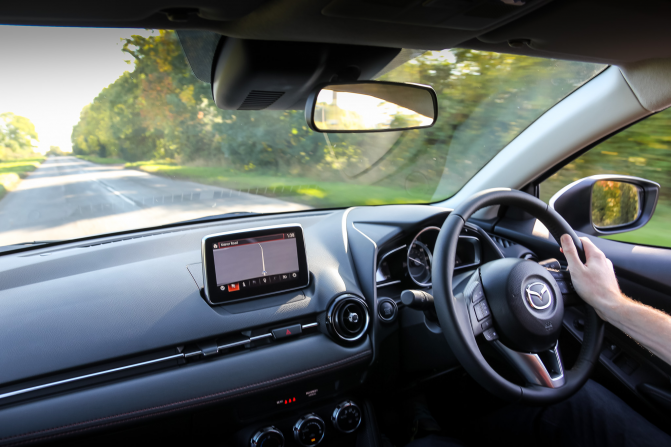
I never knew that a vibrating sensation from your car isn’t normal. I like how you elaborated on how it’s caused by a faulty component or an unbalanced tire. I should keep this in mind since I plan to purchase a vehicle in the future.